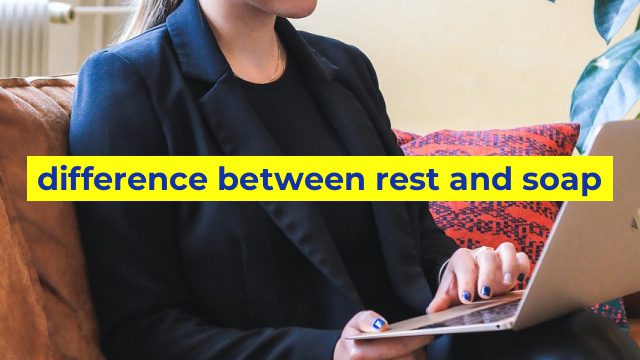The Difference Between REST and SOAP
Introduction
When it comes to web services, two of the most popular protocols are Representational State Transfer (REST) and Simple Object Access Protocol (SOAP). Both of these protocols are widely used for web-based communication, yet there are differences in their structure and configuration. In this article, we will look at the key differences between REST and SOAP and how they are used.
Structure and Configuration
REST is a much simpler protocol than SOAP. It uses the HTTP protocol primarily for transmission and supports different message types, like JSON, XML, and more. REST is also scalable, so it can handle a large number of requests, and it’s lightweight and flexible.
SOAP, on the other hand, is a more complex protocol. It can support different message protocols, like FTP, HTTP, SMTP, etc. SOAP uses the XML format for all messages, including requests, responses, and headers. This makes it more structured, but also more rigid and less flexible than REST. The larger message sizes can also make it less scalable for high throughput scenarios.
Use and Applications
REST is generally used for web services that are lightweight, fast, open and flexible. These services can be optimized for mobile platforms and are suitable for APIs that do not require a lot of built-in structure. RESTful APIs have lower overhead and can be used for caching, which can result in faster performance.
SOAP, on the other hand, is a better choice for web services that need to be richer and more standardized. An API built with SOAP can handle more complex services, such as messaging and transactions, and is suitable for enterprise-level applications. It can also offer more security features, such as WS-security and WS-addressing, which make it more secure than REST.
Conclusion
In conclusion, both REST and SOAP have their pros and cons, and the choice depends on the needs of your web service application. REST is lightweight and open, making it an excellent choice for mobile app development and lightweight web service. SOAP, on the other hand, is a more robust protocol, providing more structure and support for enterprise-level services with higher security requirements. By understanding the differences between the two protocols, you can make an informed decision on which one is the best for your project.
Table difference between rest and soap
| Category | REST | SOAP |
|---|---|---|
| Architecture | Architectural Style | Protocol |
| Protocol | HTTP | Custom Protocol |
| Message Format | JSON, XML, etc. | XML |
| Operations | GET, POST, PUT, DELETE | RPC, Document-centric |
| Security | HTTPS, OAuth, etc. | WS-Security, SAML, etc. |
| Scalability | Stateless | Stateful |
| Caching | Cacheable | Non-Cacheable |
| Client-Server Interaction | Uniform Interface | Complex Interaction Model |

